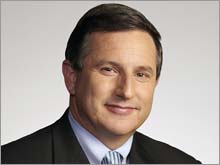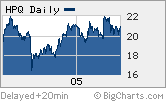 |
| New HP CEO Mark Hurd |
|
 |
| Shares of Hewlett-Packard have done well since the company hired Mark Hurd as CEO. Will the rally continue now that he has a solid quarter under his belt? |
|
|
|
|
|
NEW YORK (CNN/Money) -
The Mark Hurd era at Hewlett-Packard appears to be off to a promising start.
The big maker of printers and personal computers reported better-than-expected fiscal second-quarter sales and profits Tuesday and issued a fairly optimistic sales forecast for its third quarter. The news follows a similarly strong quarter from Dell, HP's top competitor in PCs, last week.
Shares of HP (Research) shot up 2 percent Wednesday morning and were trading just below their 52-week high.
It was a solid quarter for HP across the board, with the company reporting an operating profit in all its major businesses save software. There, losses narrowed to $6 million in the quarter from $52 million in the same period last year. During a conference call with analysts, Hurd said that he expected the software business to post a profit in HP's fourth quarter.
And HP's PC business, which has been plagued by particularly anemic profit levels, reported an operating margin of 2.3 percent in the quarter, up from 2.1 percent in HP's fiscal first quarter and 0.7 percent a year ago.
Mark Stahlman, an analyst with Caris & Co., said the results were a good sign for HP given the problems the company's faced in recent years, namely sluggish revenue growth and anemic profits in several key businesses.
But he added that investors still are most interested in hearing what Hurd's longer-term plan is to fix what ails HP. "Investors want to know what he will do in order to accelerate growth," Stahlman said.
Thundering Hurd?
Hurd, former head of cash register and ATM maker NCR, was hired as HP's CEO in late March, succeeding Carly Fiorina, who was criticized by many investors for engineering HP's ill-fated merger with Compaq.
Since that merger closed in 2002, HP has struggled to post consistent profits in PCs and so-called enterprise hardware business -- selling servers and storage products to large corporate customers -- where it faces stiff competition from Dell (Research), IBM (Research) and others.
As such, there was some speculation on Wall Street that HP would announce a major charge to write-off some of the goodwill related to the Compaq merger, as well as more layoffs. HP didn't exactly deliver on that count.
HP has also seen its rivals gain ground in printing, which is a cash cow for HP and by far its most profitable business. In fact, operating profits in printing fell 14.5 percent from a year ago despite a 4.8 percent gain in sales. HP has aggressively slashed prices of printers lately in order to hold on to market share but Hurd said that the company did not expect to keep doing so indefinitely.
"Cutting prices relentlessly is not a long-term strategy for any business," he said.
The company already announced job cuts in its printing division last month, and said Tuesday it would take a $100 million charge, or about 3 cents a share, in its fiscal third-quarter ending in July, for one-time costs from the job cuts. HP set another after-tax charge of about 3 cents a share to write off certain intangible assets.
Hurd hinted in a statement that there were more changes to come but declined to give specifics.
"Our overall performance leaves room for improvement in many of our businesses. We expect to provide details as soon as our plans are finalized that will move us toward that objective," he said.
Hurd was known during his tenure at NCR as a vigilant cost cutter and during the conference call Hurd said that he will be taking a close look at the cost structure for all of HP's operating businesses, adding that "nothing will be taken for granted."
He also said that there is a lot of "hard work" ahead for the company and that there is no quick fix. But he stressed that the company has a strong brand, loyal customers and a healthy balance sheet.
Still, some analysts have pressed HP to split up the company into several units, arguing that the value of the company in a break-up scenario is worth more than current stock price. In particular, analysts have maintained that the printing and imaging business, which accounts for more than 60 percent of HP's total operating profit, would be worth much more on a standalone basis.
But Stahlman thinks that HP's healthy results should lead to fewer calls for a break-up and that a split is less likely as long as fundamentals continue to improve.
For a look at HP and other tech blue chip stocks, click here.
For commentary about the tech sector, click here.

|